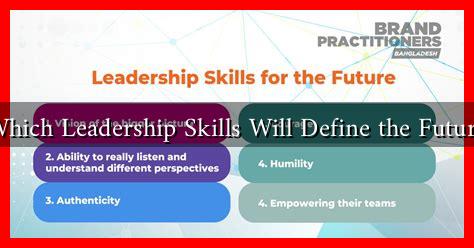-
Table of Contents
Which Leadership Skills Will Define the Future
As we navigate through an era marked by rapid technological advancements, globalization, and shifting societal values, the landscape of leadership is evolving. The skills that leaders will need to thrive in the future are not just a continuation of traditional competencies but are increasingly focused on adaptability, emotional intelligence, and inclusivity. This article explores the leadership skills that will define the future and how they can be cultivated in today’s leaders.
The Importance of Adaptability
In a world characterized by constant change, adaptability has emerged as a crucial leadership skill. Leaders must be able to pivot quickly in response to new challenges and opportunities. According to a study by McKinsey, organizations that embrace adaptability are 2.5 times more likely to outperform their competitors.
- Embracing Change: Leaders should foster a culture that embraces change rather than resists it. This can be achieved through open communication and encouraging team members to share innovative ideas.
- Continuous Learning: Future leaders must commit to lifelong learning, staying updated on industry trends and emerging technologies.
- Agile Decision-Making: The ability to make quick, informed decisions is essential. Leaders should practice agile methodologies to enhance their decision-making processes.
Emotional Intelligence: The Heart of Leadership
Emotional intelligence (EI) is increasingly recognized as a vital leadership skill. Leaders with high EI can understand and manage their own emotions while also empathizing with others. A report from TalentSmart indicates that 90% of top performers have high emotional intelligence.
- Self-Awareness: Leaders must be aware of their emotional triggers and how their behavior affects others.
- Empathy: Understanding the feelings and perspectives of team members fosters a supportive work environment.
- Conflict Resolution: Leaders with high EI can navigate conflicts effectively, turning potential disputes into opportunities for growth.
Inclusivity and Diversity in Leadership
As workplaces become more diverse, inclusive leadership is essential. Leaders who prioritize inclusivity can harness the strengths of diverse teams, leading to enhanced creativity and innovation. Research from McKinsey shows that companies in the top quartile for gender diversity are 21% more likely to outperform their peers in profitability.
- Creating Safe Spaces: Leaders should cultivate an environment where all team members feel safe to express their ideas and opinions.
- Promoting Diverse Talent: Actively seeking diverse candidates for leadership roles can lead to better decision-making and problem-solving.
- Training and Development: Implementing training programs focused on diversity and inclusion can help leaders and teams understand and appreciate different perspectives.
Technological Proficiency
In an increasingly digital world, leaders must be technologically proficient. This does not mean they need to be experts in every tool but should have a solid understanding of how technology can enhance productivity and collaboration.
- Data-Driven Decision Making: Leaders should leverage data analytics to inform their strategies and decisions.
- Fostering Digital Literacy: Encouraging team members to develop their digital skills can lead to a more competent and agile workforce.
- Embracing Automation: Understanding how automation can streamline processes will be crucial for future leaders.
Conclusion: The Future of Leadership
As we look to the future, the skills that will define effective leadership are those that promote adaptability, emotional intelligence, inclusivity, and technological proficiency. Leaders who cultivate these skills will not only navigate the complexities of the modern workplace but will also inspire their teams to achieve greater heights. By investing in these competencies, organizations can ensure they are prepared for the challenges and opportunities that lie ahead.
In summary, the future of leadership is not just about managing tasks but about leading people with empathy, agility, and a commitment to diversity. As we continue to evolve, the leaders who embrace these skills will be the ones who drive their organizations toward success.
For further insights on leadership development, consider exploring resources from the Forbes Human Resources Council.

